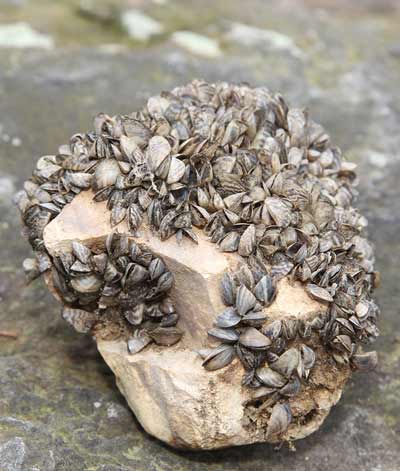
AUSTIN – The Texas Parks and Wildlife Department (TPWD) has detected invasive zebra mussels at Medina Lake and Lake Placid will be re-classified as “fully infested.” Infested status signifies that there is now evidence of an established, reproducing population of zebra mussels in the lake.
The detection in Medina Lake, located near Bandera, marks the first introduction of invasive zebra mussels in the San Antonio River Basin. On Feb. 11, a member of the public submitted a report with a photo to TPWD of a zebra mussel located at a boat ramp near the mouth of Haby’s Cove. Shortly after the winter storms, TPWD staff conducted searches at the site where the original mussel was found and near Red Cove Marina. Biologists located two zebra mussels attached to rocks along the shoreline near the site where the first mussel was discovered.
Bandera County River Authority & Groundwater District (BCRAGD) conducted a search on Feb. 24 and located a single zebra mussel attached to a settlement sampler at a dock approximately three miles upstream from the first location where zebra mussels were detected. The BCRAGD later conducted additional surveys of shorelines, boat docks, boat hulls and engines at numerous sites around the lake; no additional zebra mussels were found.
Due to these discoveries, Medina Lake will be designated “positive” for zebra mussels, which means there have been multiple detections, but evidence of a reproducing population has yet to be discovered. Plankton sampling for zebra mussel larvae will take place in May/June when they begin spawning, and settlement sampler monitoring and shoreline surveys will continue to determine if an established, reproducing population is already present or monitor its development.
”This is the first detection of zebra mussels in the San Antonio River Basin and could result not only in impacts on infrastructure, boats, and other property but also in downstream spread within the basin and introductions by boats moving from Medina Lake to other nearby lakes,” said Monica McGarrity, TPWD Senior Scientist for Aquatic Invasive Species. “Finding zebra mussels in a new river basin unfortunately means that they’ve most likely been transported there by boats, barges, or other equipment that didn’t take appropriate precautions to prevent their spread. The vigilance of all boaters and anglers is needed to stop or slow the further spread of zebra mussels in Texas lakes.”
Lake Placid, located near Seguin in the Guadalupe River Basin, was previously designated as “positive” for zebra mussels, but will now be upgraded to “fully infested” status. In May 2019, zebra mussel larvae and a single adult were documented at Lake Placid, but biologists had not yet found evidence of an established, reproducing population in the lake. However, in early February 2021, during some routine maintenance activities at the Lake Placid dam, Guadalupe-Blanco River Authority employees discovered a population of adult zebra mussels in the hydroelectric turbine near the bottom of the dam. Numerous mussels of different size classes were found, indicating the presence of an established, reproducing population.
TPWD is encouraging boaters and homeowners on Medina Lake and Lake Placid to keep an eye out for settled zebra mussels on shoreline rocks and structures or boats stored in the water and report any suspected organisms with photos to aquaticinvasives@tpwd.texas.gov. Zebra mussels grow to approximately 1-1.5 inches in length and have triangular, typically striped brown/tan shells. Unlike native mussels or non-native Asian clams, zebra mussels adhere strongly to hard surfaces.
“Although zebra mussels are now found in 31 Texas lakes, there are still many other lakes in the state that they haven’t invaded. Boaters play a critical role in preventing them from spreading to new lakes. Before traveling from lake to lake, clean, drain and dry your boat and gear. Remove plants, mud and debris, drain all the water from the boat and gear, and then open up compartments once you get home and allow everything to dry completely,” advises Brian Van Zee, TPWD Inland Fisheries Regional Director.
If you have stored your boat in the water at a lake with zebra mussels, it is likely infested with zebra mussels and poses an extremely high risk for moving this invasive species to a new lake. Before moving your boat to another lake, call TPWD at (512) 389-4848 for guidance on decontamination. The transport of aquatic invasive species can result in legal trouble for boaters or transporters. Transporting prohibited invasive species in Texas is illegal and punishable with a fine of up to $500 per violation. Boaters are also required to drain all water from their boat and onboard receptacles, including bait buckets, before leaving or approaching a body of fresh water.
A status map showing all lakes where zebra mussels have been found in Texas is online at tpwd.texas.gov/zebramussels. For more information on how to properly clean, drain and dry boats and equipment, visit the TPWD YouTube channel for a short instructional video. TPWD and partners monitor for zebra mussels in Texas lakes, but anyone who finds them in lakes where they haven’t been found before should report them by emailing photos and location information to aquaticinvasives@tpwd.texas.gov to help identify new introductions. Anyone who spots them on boats, trailers or equipment that is being moved should immediately report the sighting to TPWD at (512) 389-4848.
To learn more about zebra mussels and other invasive species in Texas, visit tpwd.texas.gov/StopInvasives. Information for marinas and owners of boats stored in the water on lakes with zebra mussels can be found on the TPWD website.
